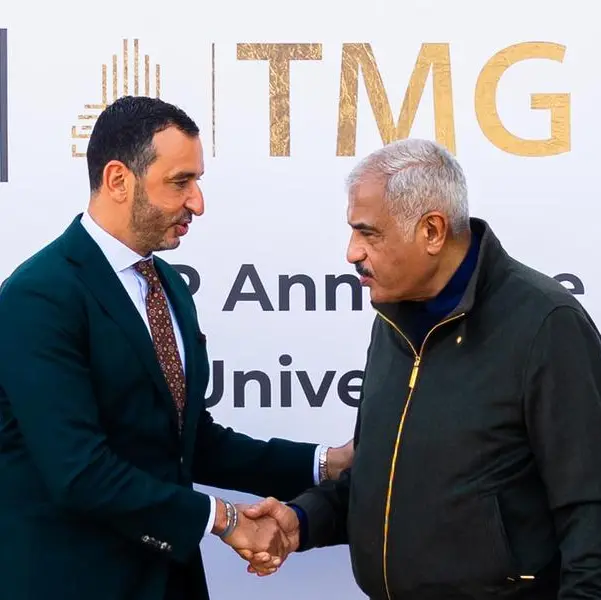DAVOS, SWITZERLAND - SABIC, a global leader in the chemical industry, has revealed its intentions for TRUCIRCLE™ solutions to drive to close the loop on plastics waste in 2020, together with global collaborators.
Ambitions were shared during a reception, hosted by SABIC Vice Chairman & CEO, Yousef bin Abdullah Al-Benyan, during the 2020 World Economic Forum (WEF) in Davos, Switzerland. Business representatives came together at the iconic, energy-efficient, quick to construct and reusable ICEHOUSE™ building, constructed using SABIC materials. The ICEHOUSE™ with ICE standing for “Innovation for the Circular Economy”, was a fitting venue for the occasion, underlining a key strategic sustainability priority for SABIC.
Closed loop recycling of plastic will see post-consumer plastic waste collected, recycled and used to make new products. For this vision to actually work, consumers, retailers, recyclers and manufacturers must work together to reclaim valuable materials from our waste stream and process them to make new products. This process requires a total transformation of the value chain, which SABIC has been working hard with its downstream and upstream collaborators to achieve.
SABIC has driven significant advancements to date and is leading the way in the drive to close the loop through alliances with partners, customers and collaborators across the value chain. During the past 12 months, SABIC customers and brandowners, such as Unilever and Tupperware Brands, have pioneered and brought to market an array of commercially viable and highly anticipated consumer products which leverage SABIC’s ground-breaking TRUCIRCLE™ solutions made possible by a collaboration with UK-based Plastic Energy Ltd. which enables the recycling of plastic waste which has historically been classified as non-recyclable.
SABIC developments have led to the launch of TRUCIRCLE™, a complete portfolio of solutions that span design for recyclability, mechanically recycled products, certified circular products from feedstock recycling of plastic waste streams and certified renewables products from bio-based feedstock. Since the launch in late 2019, TRUCIRCLE™ has received unprecedented demand from businesses looking for commercially and environmentally viable solutions which help to address the plastic waste challenge.
Mark Vester, Circular Economy Leader at SABIC, said: ‘At SABIC, we firmly believe that true collaboration and innovation will drive positive change, and we’ve collaborated with a wide range of companies across the value chain to get to where we are today. With our TRUCIRCLE™ initiative, we’re more committed than ever to building a circular economy and closing the loop on plastic waste in 2020.
‘2020 will see us forge bold, new collaborations with high calibre partners in order to create a circular, transparent and sustainable economy for plastics, and we invite players from across the value chain to join us to truly transform our world.’
SABIC has also confirmed new collaborations to take the organisation ever closer to bringing its new semi-commercial plant online. The new facility in the Netherlands, located at SABIC’s Geleen site, will increase the production of pyrolysis oil from plastic waste, and is expected to be operational by 2021. Certified circular polymers will be produced from a feedstock known as Tacoil – a patented product from UK-based Plastic Energy Ltd. – from the recycling of low quality, mixed plastic waste otherwise destined for incineration or landfill.
With new agreements established recently, Danish company, Haldor Topsøe, will provide license and basic engineering for a novel hydrotreating solution, and Renewi, a leading waste to product company, will build a dedicated formulation line that will supply feedstock from mixed plastic waste for the pyrolysis process.
The output from the site will initially provide materials for SABIC’s downstream collaborators but the long term intention is to rapidly scale up the supply of its certified circular polymers for all global customers.
As part of its commitment to closing the loop, SABIC became a founding member of the World Plastics Council and the Alliance to End Plastic Waste and a partner of The Ocean Clean-Up. Each initiative aims to prevent plastic waste from reaching marine environments and ecosystems or to remove them. The organisation also sees each of its TRUCIRCLE™ solutions as a firm contribution to its efforts to meet the UN Sustainable Development Goals.
SABIC’s commitment to using more plastic waste as feedstock for its circular polymers runs parallel to its 2020 ambition to increase the uptake of recycled plastic from mechanical recycling. SABIC is determined to increase the amount of plastic it processes in Europe to 200.000 metric tons by 2025, in line with its pledge to the EU Commission.
© Press Release 2020Disclaimer: The contents of this press release was provided from an external third party provider. This website is not responsible for, and does not control, such external content. This content is provided on an “as is” and “as available” basis and has not been edited in any way. Neither this website nor our affiliates guarantee the accuracy of or endorse the views or opinions expressed in this press release.
The press release is provided for informational purposes only. The content does not provide tax, legal or investment advice or opinion regarding the suitability, value or profitability of any particular security, portfolio or investment strategy. Neither this website nor our affiliates shall be liable for any errors or inaccuracies in the content, or for any actions taken by you in reliance thereon. You expressly agree that your use of the information within this article is at your sole risk.
To the fullest extent permitted by applicable law, this website, its parent company, its subsidiaries, its affiliates and the respective shareholders, directors, officers, employees, agents, advertisers, content providers and licensors will not be liable (jointly or severally) to you for any direct, indirect, consequential, special, incidental, punitive or exemplary damages, including without limitation, lost profits, lost savings and lost revenues, whether in negligence, tort, contract or any other theory of liability, even if the parties have been advised of the possibility or could have foreseen any such damages.



















